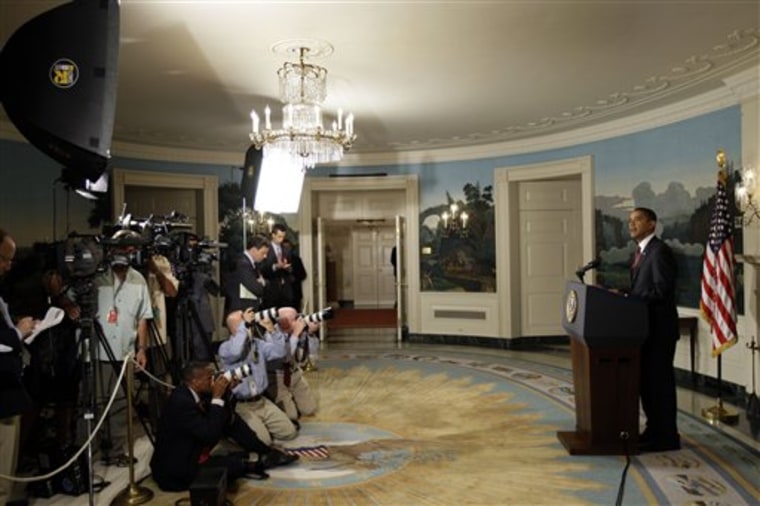President Barack Obama, projecting confidence health care legislation will clear Congress, urged lawmakers strongly on Friday to write stiffer cost-cutting provisions into the bills taking shape slowly in the House and Senate.
"What we want to do is force the Congress to make sure that they are acting" on recommendations lawmakers receive to hold down Medicare and Medicaid spending, the president said, rather than allowing reports to sit unused on a shelf.
He spoke from the White House, near the end of a week of tumult for the legislation atop his domestic agenda.
A few hours earlier, two House committees approved their portions of the sweeping health care bill over Republican objections.
That left one more panel to act, but conservative Democrats were rebelling, demanding additional measures to hold down skyrocketing costs.
Given the complexities, as well as fresh calls for delay in the Senate, House Speaker Nancy Pelosi, D-Calif., opened the door to pushing off a vote past the early August timeline she and Obama laid out weeks ago.
Whatever the difficulties, she predicted legislation would pass that will transform the nation's health care system, extending coverage to an estimated 50 million Americans who lack it while slowing the growth in costs generally. "It is really historic. It's transformation. It's momentous," she told reporters at a news conference.
Fighting at committee level
For now, it was also messy.
Two House committees approved their portions of the bill on party-line votes in marathon sessions, one shortly after midnight, the other after an all-night session than ran 20 hours.
Republicans sought unsuccessfully in both the Ways and Means Committee and the Education and Labor panel to strip out key portions of the bill, including a new tax on the wealthy and a requirement for the government to sell insurance in competition with private companies.
That left one more panel, the Energy and Commerce Committee, to take action, and there, renegade Democrats were seeking greater cost cutting as well as other changes before providing the votes necessary to send the legislation to the floor for a vote by the full House.
The White House stepped in, as well.
One day after the director of the non-partisan Congressional Budget Office said the legislation did little or nothing to slow the rate of increase in costs, the Obama administration responded by calling for additional steps to ensure the bill "rewards quality, restrains unnecessary costs and provides better care to more Americans."
Legislation is already pending in the Senate to reduce the control individual lawmakers and Congress as a whole has over setting the rates doctors and other providers are paid under Medicare, the government health care plan for the elderly. In a letter to Democratic leaders, White House Budget Director Peter Orszag forwarded an alternative proposal that he said would accomplish the same goal.
"We're very proud of the savings (already in the legislation)" Pelosi told reporters, although she added, "Of course, we want more."
Obama asked Congress months ago to approve legislation helping millions of uninsured Americans receive health care, as well as hold down the growth of spending in medicine.
Any legislation that emerges is expected to require insurance companies to issue policies to anyone who seeks coverage, without turning them down or charging higher premiums on the basis of pre-existing medical conditions.
To spread insurance more widely, both the House bill and companion proposals in the Senate would rely on hundreds of billions of dollars in federal subsidies to assist lower income families. The House bill also calls for the government to sell insurance in competition with private industry, a provision that Republicans in particular oppose strongly.
While Pelosi has long said the House will vote on legislation by the time lawmakers leave on vacation at the end of July, she hedged for the first time at the news conference.
"We have to see what the Senate will do," she said, before suggesting that changing the bill to produce more savings might require additional time.
For now, she emphasized, "we are on our schedule to bring up legislation before the break and we continue to be on that schedule."
Slowdown in the Senate
The sense of urgency diminished in the Senate, where bipartisan negotiators ended talks for the week with no indication a deal was imminent and a different group of six Democrats and Republicans announced its opposition to "timelines which prevent us from achieving the best result."
The White House and Senate Majority Leader Harry Reid are pushing for legislation to clear both houses by August, but the six holdouts said in a letter that "we believe that taking additional time to achieve a bipartisan result is critical."
The letter was signed by Democratic Sens. Ben Nelson of Nebraska; Ron Wyden of Oregon and Mary Landrieu of Louisiana; as well as Maine Republican Sens. Susan Collins and Olympia Snowe and independent Sen. Joe Lieberman of Connecticut.
